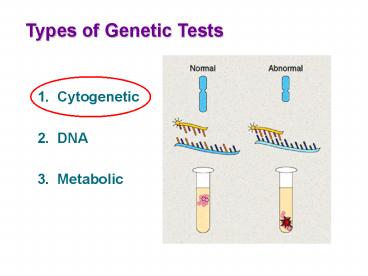1. Cytogenetic - PowerPoint PPT Presentation
1 / 26
Title:
1. Cytogenetic
Description:
green = probe for end of chromosome 4. DiGeorge syndrome/CATCH22 ... green = control ... characteristic, ie. thumb shape or lack of a particular ... – PowerPoint PPT presentation
Number of Views:912
Avg rating:3.0/5.0
Title: 1. Cytogenetic
1
Types of Genetic Tests
- 1. Cytogenetic
- 2. DNA
- 3. Metabolic
2
- karyotype
- picture of the chromosomes in a cell used to
check for abnormalities
Prenatal diagnosis Trisomy 21 (Downs syndrome)
3
Postnatal Diagnosis
4
Postnatal Diagnosis Detecting Cancer
5
- Preparing a karyotype
- harvest cells (from where?)
Postnatal diagnostic karyotype Prenatal
diagnostic karyotype
6
- Preparing a karyotype
- harvest cells
- Postnatal diagnostic karyotype
- tumor biopsy
- skin cells from mouth (ie. for non-cancer related
diagnoses) - Prenatal diagnostic karyotype
- chorionic villi sampling (CVS)
- amniocentesis
7
- Who is offered amniocentesis or CVS?
- maternal age (women 35 or older)
- Risk of Downs syndrome
- mother in 20s 1/1250 99.92 OK
- mother at 35 1/400 99.75 OK
- mother at 40 1/100 99 OK
8
Downs syndrome how does it happen?
chromosomal nondisjunction during meiosis of eggs
and sperm
1. chromosomes replicate
2. homologous chromosomes separate
3. chromatids from each chromosome separate
9
- Who is offered amniocentesis or CVS?
- maternal age (women 35 or older)
- Risk of Downs syndrome
- mother in 20s 1/1250 99.92 OK
- mother at 35 1/400 99.75 OK
- mother at 40 1/100 99 OK
- a previous child or pregnancy with a birth
defect - screening test with a positive result
- other family history
10
Prenatal diagnosis amniocentesis
- sampling cells from amniotic fluid
- usually done 15-18 weeks
11
Prenatal diagnosis chorionic villi sampling
(CVS)
- sampling cells from placenta
- usually done 10-12 weeks
12
- Preparing a karyotype
- harvest cells
- culture cells 1-2 days
- arrest cells in metaphase with colchicine
metaphase
13
MITOSIS
chromosomes condense
DNA replication
nuclear envelope breaks down
metaphase
chromosomes aligned on spindle fibers
14
- Preparing a karyotype
- harvest cells
- culture cells 1-2 days
- arrest cells in metaphase with colchicine
- spread cells on slide and stain
- count chromosomes in 20 representative cells
- capture image of 5 best cells and construct
karyotypes for each
metaphase
15
FISH analysis of chromosomes Fluorescent IN
SITU hybridization
metaphase spread chromosomes stained with DAPI, a
fluorescing stain that specifically binds double
stranded DNA
16
FISH Fluorescent IN SITU hybridization
Expose DAPI-stained metaphase chromosomes to
fluorescent probes red control probe for
centromere of the X chromosome another probe
for end of chromosome X
green probe for end of chromosome 4
17
- DiGeorge syndrome/CATCH22
- microdeletion on chromosome 22
- birth defect that affects the immune system
- absence of or underdevelopment of the thymus and
parathyroid glands - facial features include low-set ears, wide-set
eyes, small jaw, and bowing up of upper lip
18
FISH tests DiGeorge syndrome
Expose DAPI-stained chromosomes to mixture of
fluorescent probes green control probe for
chromosome 22 red probe for DiGeorge region on
long arm of chromosome 22
19
FISH tests Painting chromosomes
Expose chromosomes to fluorescent probes that
highlight entire chromosomes
20
FISH tests Painting chromosomes
Expose chromosomes to fluorescent probes that
highlight chromosomes 13, 18, 21, X, and Y
nuclei from the same fetus
green chromosome 13 red chromosome 21
aqua chromosome 18 green X chromosome red Y
chromosome
21
Trait ---physical characteristic that is
determined by genes, ie. eye color
22
Human traits
Thumb shape
hh
Hh or HH
Hitchhikers thumb
Earlobe attachment
AA or Aa
aa
unattached attached
23
Human traits
Thumb shape
hh
Hh or HH
Hitchhikers thumb
Genotype vs. Phenotype Genotype specific
allelic makeup of an individual, ie. HH, Hh or
hh Phenotype an observable physical or
measurable biochemical characteristic, ie. thumb
shape or lack of a particular enzyme
24
Punnett squares ---remember these?? Used to
determine the probability of an offspring having
a particular genotype
hh
Hh or HH
H H
Hitchhikers thumb
H h
H allele dominant h allele recessive
25
Punnett squares ---now try it backwards
hh
Hh or HH
Hitchhikers thumb
Hh
Hh
H allele dominant h allele recessive
hh
hh
26
Recombination shuffling the deck ---DNA
crossovers in chromosome pairs that results in
children receiving a different combination of
genes than either parent































